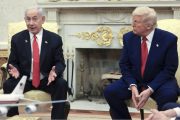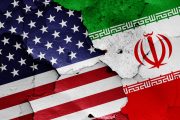
A missile fired by Houthi rebels in Yemen at the Saudi Arabian capital, Riyadh, was shot down by Saudi Arabia’s military on December 19. Saudi officials and Colonel Turki al-Maliki, a spokesman for the Saudi-led coalition that is fighting the rebels, said the missile was intercepted by a U.S.-supplied Patriot missile while in flight south of the city. There were no reports of any damage.
The Houthis’ Al Masirah TV reported that a Burkan H2 ballistic missile had targeted a “meeting of the leadership of the Saudi regime in al-Yamama Palace in Riyadh.” A statement posted on Al Masirah’s website said the missile was fired “in response to the heinous crimes committed by the U.S.-Saudi aggression against the people of Yemen.”
A December 20 report from the BBC said that Iran has denied backing the rebels militarily and insisted that the missile launches are “independent actions” in response to Saudi-led coalition aggression.
Conservative columnist Patrick Buchanan is open to the possibility that missiles fired by the by Houthi rebels at the Saudis were made legitimately in retaliation for Saudi attacks against their people and country. (More on this below.)
Shortly after the interception of the missile near Riyadh, U.S. ambassador to the UN Nikki Haley said that there is mounting evidence that Iran is supplying arms to the Houthi rebels, in violation of the resolution that put the Iran nuclear deal into international law.
“This is the Secretary-General’s fourth report on the Iranian regime’s lack of full compliance with Resolution 2231,” said Haley, referring to the UN resolution that codified the nuclear deal. “And it is the most damning report yet. This report makes the case that Iran is illegally transferring weapons [to the Houdis].”
Haley continued: “the Secretary-General’s report refers to debris from missiles fired by Houthi militants from Yemen into Saudi Arabia in July and November of this year. The inventory at the warehouse in Washington removes any shred of doubt that the missiles are from Iran.”
Resolution 2231 states, “Iran is called upon not to undertake any activity related to ballistic missiles designed to be capable of delivering nuclear weapons, including launches using such ballistic missile technology,” but according to diplomats the language is not legally binding and cannot be enforced with punitive measures. Also, there is no evidence that the missiles fired at Saudi Arabia in July, November, and December are capable of delivering nuclear weapons.
At the December 19 Security Council meeting, UN Undersecretary-General for Political Affairs Jeffrey Feltman told the Council that “the Secretary-General has again not received any report regarding the supply, sale or transfer to Iran of nuclear-related items undertaken contrary to the provisions of the resolution.”
These statements by Haley and UN officials once again point out the drawbacks of the United States relying on UN resolutions, instead of conducting our foreign policy as an independent sovereign state. Furthermore, our involvement in the conflict between the Saudis and the Houthi militants also highlights the downside of U.S. interventionism, as we continue to involve ourselves in overseas disputes that are unrelated to the defense of our own nation.
The December 20 BBC report observed that Saudi Arabia intervened in Yemen’s s civil war in March 2015 “partly to counter perceived Iranian influence on the Houthis, which champion the Zaidi Shia minority.”
BBC reported that Iran has denied backing the rebels militarily and insisted that the missile launches are “independent actions” in response to Saudi-led coalition aggression.
More than 8,670 people have been killed and 49,960 injured since the coalition intervened in Yemen’s war, BBC reported, citing UN figures.
The fighting and the coalition blockade have also left 20.7 million people in need of humanitarian aid, created the world’s largest food security emergency, and led to a cholera outbreak that is thought to have killed 2,219 people since April, noted BBC.
In a December 18 column, conservative commentator Patrick Buchanan questioned Haley’s comments at a press conference at last week where she presented what she described as recovered pieces of a missile fired by Houthi militants from Yemen into Saudi Arabia in a November attack. The ambassador stated that the fragments bore “Iranian missile fingerprints.”
Buchanan wrote:
Though the rocket had Iranian markings, it was not launched from Iran, or by Iranians. Houthi rebels, for two years victims of a savage war waged by the Saudis — using U.S.-made planes, missiles, bombs and drones — say they fired it at the Riyadh airport in retaliation for what the Saudis have done to their people and country.
Buchanan then made a remarkable conclusion:
If so, it was a legitimate act of war.
Buchanan’s comments were from a column that suggested that Haley’s statements looked like a looked like a “prewar briefing” against Iran. After summarizing many of our interventionist actions in the Middle East that have only served to further destabilize the region, Buchan asked: “As for these Mideast ‘conflicts,’ which did Iran start?” He continued:
We started the wars in Afghanistan and Iraq. NATO started the war in Libya. The U.S. helped trigger the horrific Syrian civil war by arming “rebels.” Only when President Bashar Assad looked like he was about to fall did Russia and Iran intervene on his side….
Are we now to fight a new Mideast war against a larger enemy than any of the others we have fought, to clean up the bloody mess we made of the region by our previous military interventions?
We noted in our article last February (“What Is the U.S. Military Doing in Yemen? Is It Worth the Cost?”): “The commando raid by U.S. Navy SEALs in Yemen on January 29 reportedly killed 14 al-Qaeda operatives. But at least 15 civilians including an eight-year-old girl were also killed, as was one Navy SEAL.”
We noted in that article that the conflict in Yemen that has prompted U.S. intervention has been years in the making, so it is difficult to provide all of its background concisely, but as we noted in an article in 2015, our intervention in the beleaguered nation has only aggravated the situation. We observed in that article:
Much of this counterproductive intervention came under the leadership of exiled President [Abed Rabbo Mansour] Hadi when he was still in power. An article posted by The New American in 2012 noted that since 2002, 358 people had died in Yemen in U.S. drone strikes. In a statement made to the Washington Post in an interview published September 29, 2012, President Hadi said he “personally approves every U.S. drone strike in his country.” The Post noted that it was likely this support of President Obama’s drone war that had influenced U.S. officials to consider Hadi “one of the United States’ staunchest counterterrorism allies.”
We observed that that may explain why Saudi Arabia gave Hadi refuge and is bombing Hadi’s opponents in Yemen — with U.S. support.
In September 2015, Hadi returned to the Yemen port city of Aden as Saudi-backed government forces recaptured the city.
In that article, we noted that the Houthi rebels, who are fighting against forces loyal to Hadi, are allied with forces loyal to President Ali Abdullah Saleh, who was president of Yemen from 1990 to 2012. Furthermore, Saleh’s loyalists are al-Qaeda’s most powerful opponents, but the Saudi-led bombing threatens to weaken them. Therefore, the Saudi bombing of the rebels, which is supported by the United States, has the effect of helping al-Qaeda!
Another bizarre twist to the conflict in Yemen has recently occurred.
Back in May 2015, Saleh openly allied with the Houthis. However earlier this month, he withdrew from the coalition with the Houthis and instead sided with his former enemies — Saudi Arabia, the United Arab Emirates, and President Hadi. Saleh was quickly accused of treason by the Houthis, and was killed by a Houthi sniper during a firefight in the capital city of Sana’a during a battle for the city on December 4.
There is an important point to be found in an article that former Rep. Ron Paul (R-Texas) wrote for Townhall.com in 2015, entitled: “The Failed ‘Yemen Model.’” Paul concluded his article with this point: “The lesson from Yemen is not to stay the course that has failed so miserably. It is to end a failed foreign policy that is killing civilians, creating radicals, and making us less safe.”
Ambassador Nikki Haley presenting what she described as recovered pieces of a missile fired by Houthi militants in November: AP Images
Related articles:
8-Year-Old Girl Becomes First U.S. Citizen Killed in Trump’s Drone War
U.S. Fleet to Intercept Iranian Ships Bound for Yemen
Keeping Track of Militant Islamic Groups
Iran Says Saudis Must Stop “Criminal Acts” in Yemen
Cited as “Model,” Yemen Becomes Latest Obama-Neocon Tragedy
Obama Steps Up Secret US War in Yemen
Yemen: U.S. Military Aid Can’t Save Dictator; Rebellion Escalates
What Is the U.S. Military Doing in Yemen? Is It Worth the Cost?
Missiles From Houthi Rebel-Held Area of Yemen Land Near U.S. Naval Vessel
How the U.S.-backed War on Yemen Advances Globalism (video)
U.S. Fleet to Intercept Iranian Ships Bound for Yemen
Keeping Track of Militant Islamic Groups




